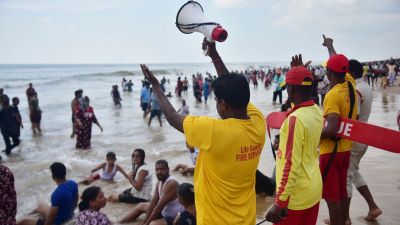Stay updated with the latest - Click here to follow us on Instagram
The desperate campaign to bring home Hamas’ only Nepali hostage
Each day, they wonder if he is alive or dead. If his captors feed him. If he has clothes. If he worries that, after 727 days, his family has given up hope.
 Burned vehicles in front of government buildings in Kathmandu, Nepal, Sept. 12, 2025. (Atul Loke/The New York Times)
Burned vehicles in front of government buildings in Kathmandu, Nepal, Sept. 12, 2025. (Atul Loke/The New York Times)Written by Pranav Baskar
For nearly two years, the family of Bipin Joshi, a Nepali student who was abducted by Hamas from a southern Israeli settlement on Oct. 7, 2023, has waged a desperate campaign to bring him home to a remote Himalayan village thousands of miles from Israel and the Gaza Strip.
But after violent anti-corruption protests erupted in Nepal and toppled the government in September, the diplomatic effort to free Joshi has been tossed into uncertainty. Newly installed leaders in Kathmandu are scrambling to fill empty ministries and rebuild a state from scratch.
Now, a two-day revolution in Nepal and a two-year war in the Middle East are converging on Joshi’s case, and an abduction that has flickered in the public consciousness has become even more grave.
“Every day, I think about him, praying to God to save his life,” his mother, Padma Joshi, 48, said in an interview Wednesday with The New York Times. “He has no side in this war. He is an innocent foreign student. Our humble request to Hamas is to let him go, my son.”
In 2023, Bipin Joshi, then 23, left Nepal to study and work in a rural area of Israel, Kibbutz Alumim, close to the Gaza border. Less than three weeks into his time there, according to Israeli officials, Hamas gunmen stormed a dairy barn where his family said he was sheltering, slaughtering dozens in the settlement and taking him hostage.
Beyond a single video showing a person who appeared to be Joshi in Gaza after the attack, the Joshi family has gleaned no information about his condition since the start of the Israel-Hamas war.
Last month, however, Hamas released a photograph of 48 hostages still held in Gaza, including Joshi, telling the world to say “farewell.” And when Prime Minister Benjamin Netanyahu of Israel read the names of the 20 living hostages in his address to the United Nations last week, Joshi’s was not on the list. Officials say that the bodies of about 25 abductees are believed to still be held by Hamas.
His loved ones refuse to let Joshi be forgotten.
Since Oct. 7, 2023, the Joshi family has routinely taken 24-hour journeys to Kathmandu, the Nepali capital, to meet with government officials, pressing them to negotiate with Arab countries, particularly Qatar, in order to communicate with Hamas’ leadership.
In August, Joshi’s mother and sister traveled to Israel to meet President Isaac Herzog and join other relatives of hostages in public demonstrations.
 From left, Padma and Pushpa Joshi, the mother and sister of Bipin Joshi, a Nepali student in Israel who was abducted by Hamas almost two years ago. (Dave Sanders/The New York Times)
From left, Padma and Pushpa Joshi, the mother and sister of Bipin Joshi, a Nepali student in Israel who was abducted by Hamas almost two years ago. (Dave Sanders/The New York Times)
Last week, they came to New York as part of Israel’s delegation at the U.N. General Assembly to bring Joshi’s case to the world’s attention. This is where the family spoke with the Times.
Since his abduction, his relatives have followed every turn of the conflict in Gaza. They are watching anxiously to determine what President Donald Trump’s ceasefire proposal will mean, as Israel ramps up its ground offensive in Gaza City. Past ceasefire attempts had filled the Joshi family with anticipation, only to fail.
And many in Israel have said Netanyahu’s military advance in Gaza will only jeopardize the safety of hostages taken during the Hamas-led assault on southern Israel on in 2023. Militants killed about 1,200 people and abducted about 250 others during the attack. More than 65,000 Palestinians have been killed since the war started, according to local officials, who do not distinguish between combatants and civilians.
“We are faithful he’ll be back very soon,” said Joshi’s sister, Pushpa Joshi, 18, who has been teaching herself English to advocate for her brother’s release. “We will complete our dreams, we will travel, we will make lots of vlogs and sing songs. We will dance in our room like we used to.”
But even his sister, who had participated in the Nepali protests, sees an uncertain path ahead.
Nepal’s Foreign Ministry, responsible for the diplomacy around Joshi, is a shell of what it was just 30 days ago. Of the 380 federal government buildings affected by the protests,
about three-fourths were either partly damaged or destroyed, according to a damage assessment team in Nepal.
The home of Nepal’s previous foreign minister, Arzu Rana Deuba, was torched, and she was bloodied in an assault by seething protesters. Sushila Karki, the interim prime minister, has become the de facto foreign minister, adding diplomacy to her sprawling portfolio of responsibilities.
“They are working in three small rooms,” said Shaswot Lamichhane, 18, an activist involved in leadership discussions with the Nepali army after the protests. He has begun organizing to ensure that the Foreign Ministry does not neglect Joshi’s case.
“There’s so much happening in Nepal that it’s very hard for anyone to focus outside of it,” he said in a phone interview last week, adding, “It’s a paralyzed ministry right now.”
Bhumika Bista, 23, Joshi’s best friend, who calls herself his sister, said in a recent phone interview: “People are busy forming new ministries, a new government and new rules of the country, so his case has been again slowed down. The family has met every concerned authority, asking them for help — but this has been really neglected because the government is itself busy in other matters.”
A spokesperson of Nepal’s Ministry of Foreign Affairs did not immediately comment. In a statement dated Sept. 10, however, it said Nepal had been “closely observing the unfolding situation in the Middle East” and was “waiting for the release” of Joshi. A month earlier, before the protests, the ministry said in another statement that Joshi’s condition was unknown, but that the country was pursuing multilateral efforts to bring him home.
 After violent anticorruption protests erupted in Nepal and toppled the government, diplomatic efforts to free Bipin Joshi have been tossed into uncertainty. (Dave Sanders/The New York Times)
After violent anticorruption protests erupted in Nepal and toppled the government, diplomatic efforts to free Bipin Joshi have been tossed into uncertainty. (Dave Sanders/The New York Times)
Pushpa Joshi, was in 10th grade when she learned he had been kidnapped. In the time that has passed, she has found herself sending him messages on WhatsApp, though none go through.
“Hello, my brother,” she texts the void. “Where are you? I miss you so much.”
In September, his relatives met with Karki to discuss Joshi’s case. While Karki assured them that no effort would be spared to bring him home, Pushpa Joshi said she was worried that Karki was “very busy” running the country to do enough.
Joshi’s abduction has left an unfillable gap in the family. His mother has become so distraught that she is prone to speaking to her absent son in her sleep. When Raksha Bandan, a Hindu festival celebrating the bond of brothers and sisters, rolls around each year, his sister burrows herself in her room.
They crave the return of the little moments. Joshi would drop his little sister at school by bicycle and assign her essays to write on world topics. A soccer lover, he is adventurous and selfless, they said, with a knack for composing poems.
In his first days in Israel, he wrote a poem to his mother in his diary, which was among his belongings later sent to the family from Israel. His sister provided a translation.
“Mother, your little child has grown so tall, / Yet I still run to your arms when I fall,” he wrote. “Mother, today I chase horizons wide, / But your lullabies still echo inside.”






- 01
- 02
- 03
- 04
- 05

























